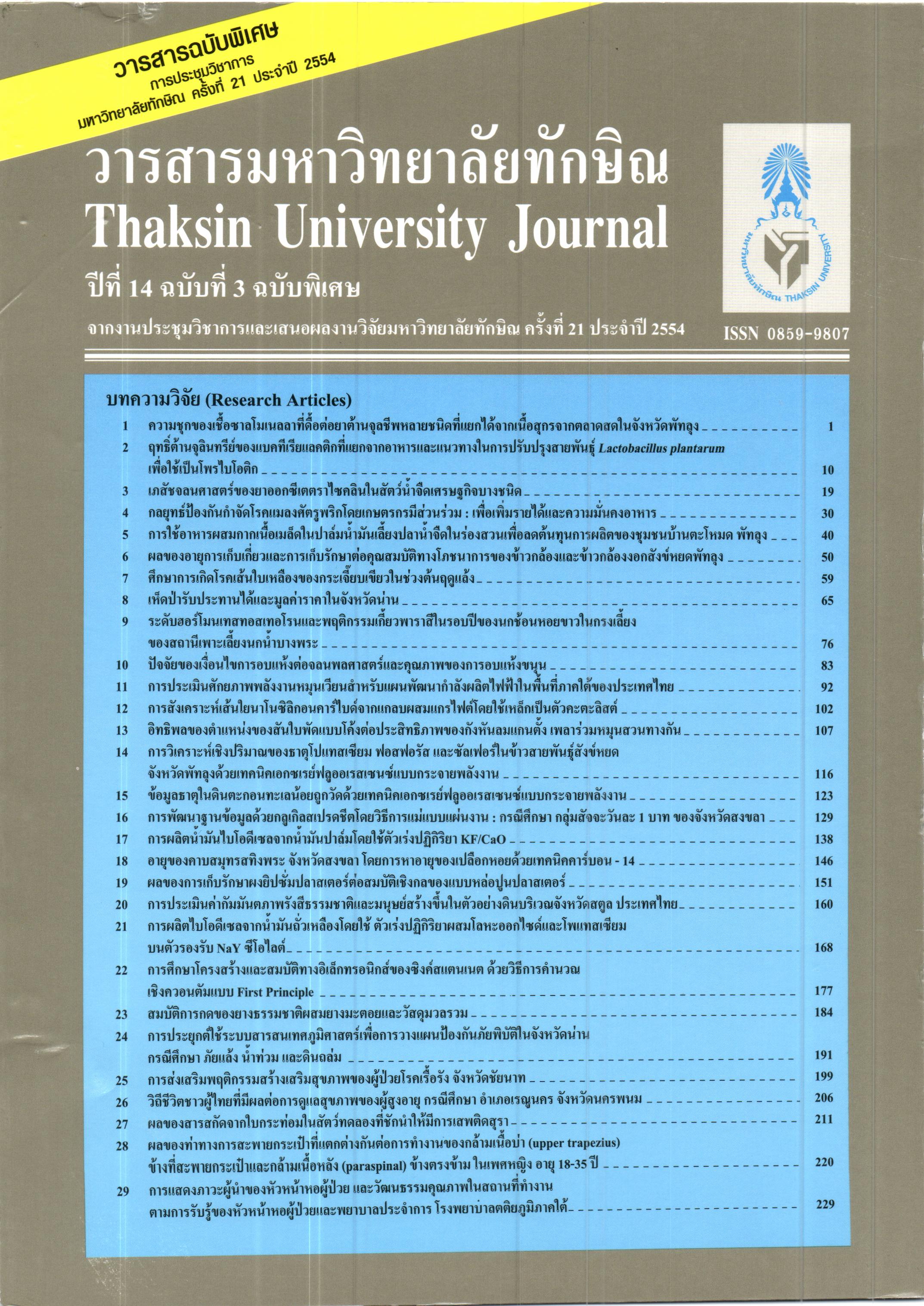กลยุทธ์ป้องกันกำจัดโรคแมลงศัตรูพริกโดยเกษตรกรมีส่วนร่วม : เพื่อเพิ่มรายได้และความมั่นคงอาหาร
Main Article Content
Abstract
การวิจัยเชิงปฏิบัติการครั้งนี้ มุ่งเน้นให้เกษตรกรมีส่วนร่วมในการป้องกันกำจัดโรคแมลงศัตรูสำคัญของพริก เพื่อเพิ่มรายได้และสร้างความมั่นคงอาหารในชุมชน พื้นที่ศึกษาวิจัย คือ บ้านต้นต้อง ตำบลพิชัย อำเภอเมือง จังหวัดลำปาง ทำการคัดเลือกกลุ่มตัวอย่าง 30 คน ใช้วิธีการสุ่มแบบเจาะจง ร วมทั้งคัดเลือกเกษตรกรอาสาสมัคร 4 คน เพื่อจัดทำแปลงสาธิตแลกเปลี่ยนเรียนรู้ในชุมชน เก็บรวบรวมข้อมูลโดยใช้แบบสอบถาม ใช้วิธีสัมภาษณ์ แบบตัวต่อตัว ดำเนินการฝึกอบรมเชิงปฏิบัติการ การสังเกตการณ์ การจัดตั้งกลุ่ม การประชุมระดมสมอง แบบมีส่วนร่วม สถิติที่ใช้ คือ ค่าร้อยละ ค่าเฉลี่ย ค่า t – test ผลการศึกษา พบว่า เกษตรกรสามารถป้องกันกำจัดโรค แมลงศัตรูพริกในไร่ได้ เมื่อเปรียบเทียบก่อนและหลังเข้าร่วมโครงการวิจัย ยืนยันว่า เกษตรกรได้รับผลผลิตและ รายได้เพิ่มขึ้นอย่างมีนัยสำคัญทางสถิติ (p < 0.01) จากการศึกษาครั้งนี้ เสนอแนะว่า การเปิดโอกาสให้เกษตรกร แลกเปลี่ยนเรียนรู้ร่วมกันโดยมุ่งเน้นการประยุกต์เทคโนโลยีที่เหมาะสมเพื่อแก้ไขปัญหาที่นำไปใช้ปฏิบัติได้จริง ทำให้เกษตรกร ผู้ปลูกพริกมีรายได้เพิ่มขึ้น ซึ่งจะส่งผลทำให้มีความมั่นคงทางด้านอาหารต่อไป
This participatory action research was focused on the encouraging farmers to participate in disease and insect pests control on Chili farming, this would imply for increase income and food security. Thirty farmers were selected by purposive random sampling from Thontong village at Muang district, Lampang province. After, establishment and development group and then selected 4 farmers who were volunteers to organize demonstration plots for knowledge exchange and collaborative learning in the community. All farmers participated in training workshops and brainstorming. Data collection was done by observation and face to face interview questionnaires. Statistical analysis such as percentage, mean and t – test were used. The results showed that, farmers can prevent disease and pest elimination on chili in their own farm. When considered to income from chili production, it was found that after participating this project, yield and income were increasingly high (p < 0.01). The finding implied that success in disease and insect pests control could be achieved by giveing a chance for farmers to exchange knowledge and collaborative learning which would help them to solve their own problems. Furthermore, this will result to increase their income and food security.


